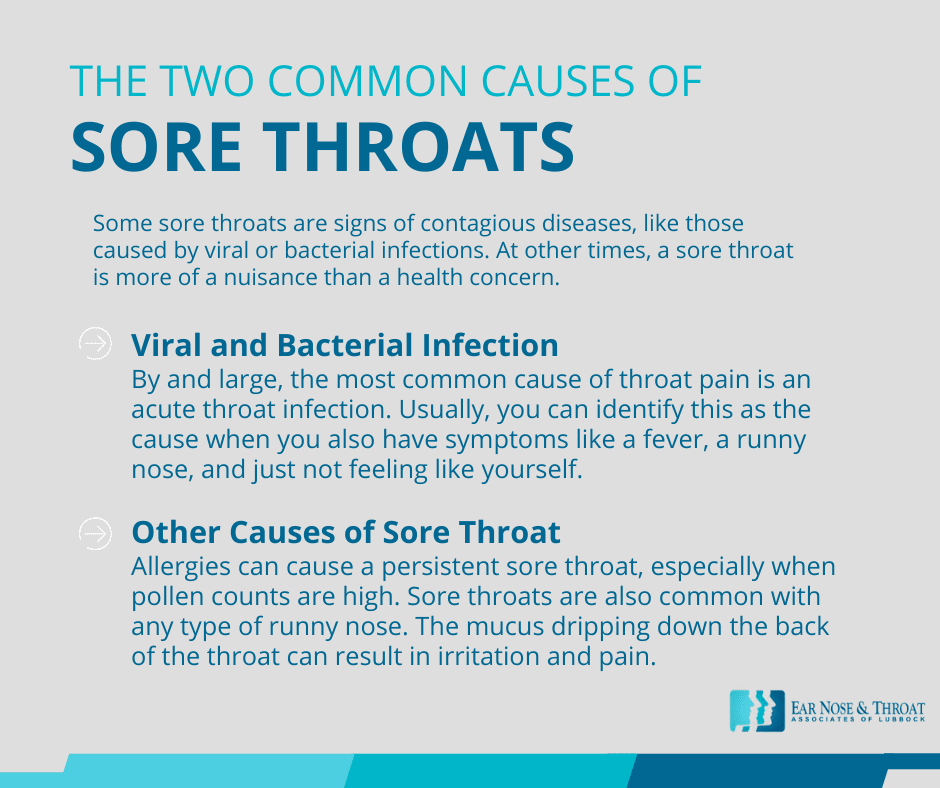Persistent Sore Throat Infection? Here’s What To Do

What started as a little tickle in the back of your throat can quickly become incredibly painful.
Sore throat pain can simply remain an annoyance, or it can worsen to the point of interfering with eating, drinking, and even swallowing.
What Causes a Sore Throat?
Sore throats have many different causes.
Some sore throats are signs of contagious diseases, like those caused by viral or bacterial infections. At other times, a sore throat is more of a nuisance than a health concern.
Viral and Bacterial Infection
By and large, the most common cause of throat pain is an acute throat infection. These sore throats are caused by a virus or bacteria.
Usually, you can identify this as the cause when you also have symptoms like a fever, a runny nose, and just not feeling like yourself.
Your doctor might perform a throat culture by rubbing a cotton swab across the tissue in your throat and sending this swab to a lab to see which bacteria or virus is causing your infection.
These acute infections don’t usually turn into recurrent throat infection. Most resolve in a few days with or without treatment.
Recurrent throat infection is usually caused by strep. Strep throat is an infection caused by a bacteria called Streptococcus pyogenes. The bacteria gets stuck in the tonsils and causes swelling, pain, and fever.

Other Causes of Sore Throat
Seasonal or environmental allergies can cause a persistent sore throat, especially when pollen counts are high. Environmental allergies are a leading cause of sore throats in the spring and early summer.
Sore throats are common with any type of runny nose. The mucus dripping down the back of the throat can result in irritation and pain.
In patients who deal with gastroesophageal reflux disease (GERD), their stomach acid causes a burning pain their throat.
When a Sore Throat Is More Serious
Though this is rare, a persistent sore throat can be the first sign of oropharyngeal cancer (throat cancer).
In the past, most people believed that throat cancer only affected lifelong smokers and heavy drinkers.
Throat cancer wasn’t considered something younger adults needed to worry about. Avoiding smoking and alcoholism were viewed as surefire ways to avoid throat cancer.
In the past several years, though, we’ve seen an uptick in younger adults diagnosed with throat cancers. Most of these cancers are due to the human papilloma virus (HPV), a common virus that is usually sexually transmitted.
If you have a persistent sore throat, it’s best to see an ENT doctor to rule out more serious causes, like oropharyngeal cancer.
What To Do if You Have a Throat Infection
Most sore throats only last a few days. If you have other symptoms of a viral infection (runny nose, watery eyes, cough), your illness will likely run its course in a few days.
Home remedies can help alleviate some of your misery in the meantime.
What If I’m Not Better in a Few Days?
Using a flashlight and a mirror, look in the back of your throat (or have a family member do this for you). Is there any yellow pus in your throat or on your tonsils? This is a hallmark sign of strep throat, especially when you also have a fever.
If you think you have strep throat, or if home remedies just aren’t cutting it after a couple days, don’t hesitate to contact your doctor. They’ll be able to tell you what’s really going on.
Ask Your Doctor if You Need Antibiotics
It’s important to see a doctor soon when you have signs of strep throat. Even though this infection is easy to treat with antibiotics, untreated strep can be dangerous.
Left untreated, strep infections can spread to other parts of the body. This can lead to more serious issues, like rheumatic fever, heart problems, kidney failure, and severe joint pain.
Tonsillectomy for Recurrent Throat Infection
If you’ve had strep throat six or more times in one year, you and your doctor may need to consider removing your tonsils. This can also help if you’ve had strep more than three or four times a year for several years in a row.
If you receive antibiotics for strep several times and it keeps recurring, discuss a tonsillectomy with your ENT doctor.
A tonsillectomy is usually an outpatient procedure that lasts about 20-30 minutes. It’s performed under general anesthesia, so you’ll be asleep the whole time.
A tonsillectomy leaves no visible scare, since the tonsils are removed through the mouth. But there will be some scabbing in the throat while the area heals.
You’ll also need to be careful to stay hydrated after the procedure. You’ll want to stick to soft foods until your throat is feeling better. (Ice cream and mashed potatoes for the win!)
Most cases of strep throat involve the tonsils, so this surgery can drastically cut down on the number of sore throats you get each year.
What’s the Outlook for Someone with Recurrent Throat Infections?
Even though recurrent throat infections are miserable in the moment, there’s a light at the end of the tunnel! The outlook is excellent.
The vast majority of cases of strep throat are successfully treated with antibiotics. More chronic cases are almost always successfully treated with tonsillectomy.
Dealing with a Persistent Sore Throat?
At ENT Associates of Lubbock, we treat the whole family, from children on up through Grandma and Grandpa!
No matter what’s causing your recurrent sore throat, we can help you get to the bottom of it so you can get back to your life! Whether your recurrent throat infection is caused by strep, allergies, reflux, or something else, we’re here to help.
Give us a call to schedule a consult today!
Dr. Scolaro is a board-certified Otolaryngologist servicing the South Plains area. He has been practicing in Lubbock since 1990 and has earned a reputation as a skilled and experienced surgeon. He currently serves as the Medical Director for Covenant High Plains Surgery Center campuses, is a member of Covenant Health Partners and is an adjunct faculty professor for Texas Tech University Health Sciences Center School of Medicine. Learn more about Dr. Scolaro.
Categories:








